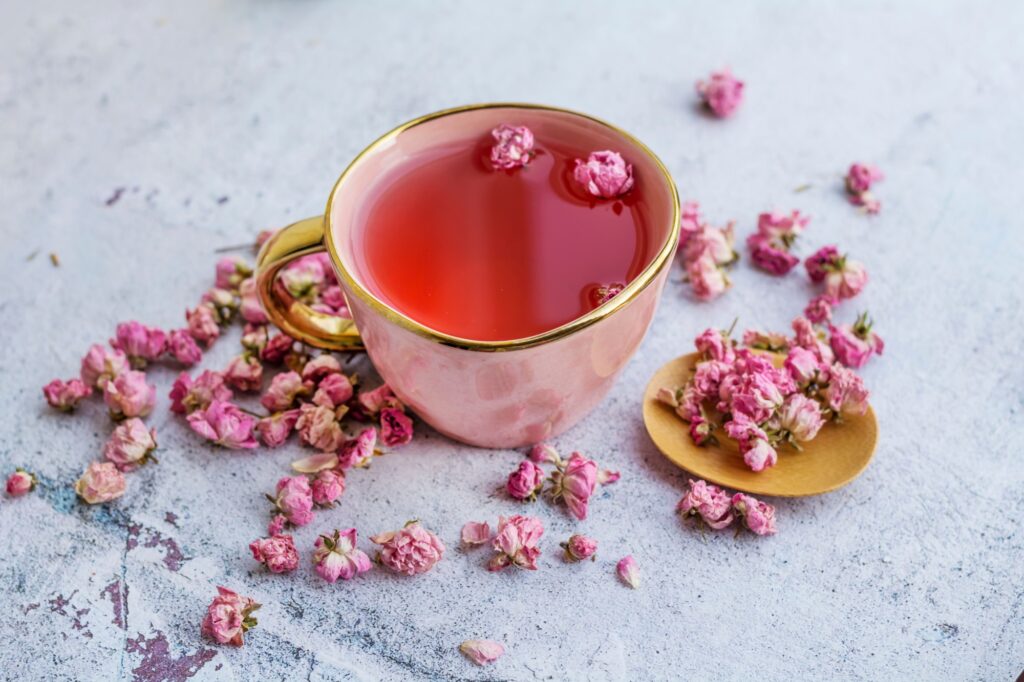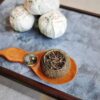
Indulge in the delicate aroma and exquisite flavor of roses with our enchanting rose tea recipe. This delightful infusion is the perfect way to add a touch of elegance to your tea time rituals. Bursting with floral notes and natural sweetness, rose tea is not only a treat for your taste buds but also offers numerous health benefits.
Using only the finest organic rose petals, our recipe combines the gentle fragrance of roses with the comforting warmth of tea. The result is a symphony of flavors that will captivate your senses and leave you feeling rejuvenated.
Whether you prefer it hot or iced, our rose tea recipe is sure to become your new favorite. So take a moment to pamper yourself and experience the blossoming delights of our perfect rose tea recipe.
Health Benefits of Rose Tea
Rose tea not only offers a delightful sensory experience but also provides an array of health benefits. The petals of the rose contain natural compounds that have been used for centuries in traditional medicine. Here are some of the health benefits you can enjoy by incorporating rose tea into your daily routine:
1. Rich in Antioxidants: Rose tea is packed with antioxidants that help to neutralize harmful free radicals in the body. These antioxidants protect cells from damage and can help reduce the risk of chronic diseases such as heart disease and certain types of cancer.
2. Boosts Immune System: The vitamin C content in rose tea can help boost your immune system, keeping you healthy and warding off common infections. It also contains antibacterial and antiviral properties that provide an additional line of defense against pathogens.
3. Calming and Relaxing: The aroma of roses has a calming effect on the mind and body. Drinking rose tea can help reduce stress, promote relaxation, and improve sleep quality. It is an ideal beverage to unwind after a long day and find a moment of tranquility.
4. Digestive Aid: Rose tea has been traditionally used to soothe digestive issues such as bloating, indigestion, and constipation. It can help alleviate stomach cramps and promote healthy digestion.
5. Skin Health: The antioxidants and vitamin C present in rose tea are beneficial for your skin. The tea can help improve skin texture, reduce inflammation, and promote a youthful complexion. It is often used in skincare products for its hydrating and toning properties.
History of Rose Tea
The tradition of using roses for medicinal and culinary purposes dates back thousands of years. The ancient Egyptians, Greeks, and Romans revered the rose for its beauty and therapeutic properties. The practice of infusing rose petals in hot water to create a fragrant and flavorful tea can be traced to ancient Persia (modern-day Iran).
Rose tea gained popularity in Europe during the Renaissance period when traders brought back exotic spices and teas from the East. The delicate flavor and aromatic qualities of rose tea soon captivated the palates of the noble class, and it became a sought-after beverage in royal courts.
In traditional Chinese medicine, rose tea has been used for its cooling properties and ability to balance the body’s energy. It is believed to promote circulation, relieve menstrual discomfort, and nourish the skin.
Today, rose tea continues to be cherished for its delightful taste and therapeutic properties. It has become a staple in tea culture around the world, admired for its elegant charm and versatility.
Different Types of Rose Tea
Rose tea comes in various forms, each offering a unique flavor profile and aroma. Here are some of the most popular types of rose tea:
1. Rose Bud Tea: Made from whole rosebuds, this type of rose tea offers a delicate and subtly sweet flavor. The buds are carefully picked when they are still tightly closed, preserving their freshness and fragrance. Rose bud tea is known for its calming properties and is often enjoyed before bedtime.
2. Rose Petal Tea: This type of rose tea is made from dried rose petals. It has a slightly stronger flavor compared to rose bud tea and can be brewed on its own or blended with other herbal teas for a more complex taste. Rose petal tea is known for its uplifting and soothing qualities.
3. Rose Black Tea: Combining the boldness of black tea with the floral essence of roses, rose black tea offers a rich and aromatic experience. The robust flavor of black tea pairs perfectly with the sweet and fragrant notes of roses, creating a harmonious blend.
4. Rose Green Tea: Green tea infused with rose petals creates a refreshing and invigorating beverage. The grassy undertones of green tea complement the floral aroma of roses, resulting in a light and balanced cup of tea. Rose green tea is known for its antioxidant properties and is a popular choice for those seeking a healthier alternative.
5. Rose Herbal Blends: Rose petals are often used as an ingredient in herbal tea blends. Combined with other herbs and botanicals, rose adds a touch of elegance and natural sweetness to the blend. Herbal rose teas can consist of ingredients such as chamomile, lavender, hibiscus, or mint, offering a diverse range of flavors and health benefits.
How to Make Rose Tea at Home
Making rose tea at home is a simple and enjoyable process that allows you to customize the strength and flavor to your liking. Here is a step-by-step guide to brewing the perfect cup of rose tea:
Step 1: Gather Your Ingredients
To make rose tea, you will need the following ingredients:
- Organic rose petals or rose buds
- Filtered water
- Teapot or a heatproof container with a lid
- Tea infuser or strainer
Step 2: Prepare the Tea
- Measure out one teaspoon of dried rose petals or rose buds per cup of water. Adjust the amount according to your preference for a stronger or milder flavor.
- Rinse the petals or buds under cold water to remove any debris or impurities.
- Bring the water to a boil in a kettle or saucepan.
- Place the rose petals or buds in a teapot or heatproof container.
Step 3: Infuse the Tea
- Pour the boiling water over the rose petals or buds in the teapot.
- Cover the teapot with a lid and let the tea steep for about 5-7 minutes. Adjust the steeping time based on your desired strength.
- If using a tea infuser, simply place the petals or buds in the infuser and steep in a cup of boiling water for the recommended time.
Step 4: Strain and Serve
- After the steeping time is complete, strain the tea to remove the petals or buds.
- Pour the fragrant rose tea into your favorite teacups or mugs.
- You can enjoy the tea as is, or add a natural sweetener such as honey or a squeeze of lemon for extra flavor.
Step 5: Store and Enjoy
- Rose tea can be enjoyed hot or cold. If you prefer iced rose tea, let the brewed tea cool and then refrigerate it before serving over ice.
- Store any remaining rose tea in a sealed container in the refrigerator and consume within a few days for the best flavor.
Tips for Brewing the Perfect Cup of Rose Tea
To ensure a flavorful and aromatic cup of rose tea, here are some tips to keep in mind:
1. Quality Ingredients: Use high-quality organic rose petals or rose buds to ensure the best flavor and aroma. Look for petals that are vibrant in color and have a fresh fragrance.
2. Water Temperature: For delicate rose tea, avoid using boiling water as it can scorch the petals and result in a bitter taste. Instead, let the water cool for a couple of minutes after boiling before pouring it over the petals or buds.
3. Steeping Time: The ideal steeping time for rose tea is around 5-7 minutes. Adjust the time based on your personal preference for a stronger or milder flavor. Be careful not to oversteep, as it can lead to a bitter taste.
4. Experiment with Blends: Don’t be afraid to experiment with different blends and flavors. You can add other herbs or teas such as chamomile, lavender, or green tea to create a more complex taste profile.
5. Sweeten to Taste: Rose tea has a naturally sweet and floral flavor, but you can enhance it by adding a natural sweetener such as honey or a squeeze of lemon. Adjust the sweetness to your liking.
Pairing Rose Tea with Food and Desserts
Rose tea’s delicate floral notes and natural sweetness make it a versatile beverage that can be paired with a variety of foods and desserts. Here are some delightful combinations to try:
1. Light Salads: The refreshing and fragrant qualities of rose tea pair well with light salads, especially those with citrus or berry components. The subtle sweetness of the tea complements the vibrant flavors of fresh fruits and greens.
2. Pastries and Sweets: Indulge in the decadent combination of rose tea and pastries. Pair a warm cup of rose tea with buttery croissants, macarons, or delicate shortbread cookies. The floral notes of the tea elevate the flavors of these sweet treats.
3. Middle Eastern Cuisine: Rose tea is a popular accompaniment to Middle Eastern dishes. Its floral essence complements the aromatic spices and flavors found in dishes such as falafel, hummus, and baklava.
4. Floral Infused Desserts: Enhance the floral experience by pairing rose tea with desserts infused with other floral flavors. Enjoy a slice of lavender cake, rosewater ice cream, or jasmine-infused chocolates alongside a cup of rose tea for a truly enchanting treat.
Where to Buy Rose Tea
You can find rose tea in various forms at specialty tea shops, health food stores, and online retailers. Look for reputable brands that offer high-quality organic rose petals or rose buds. Ensure that the tea is free from additives or artificial flavorings for an authentic and pure rose tea experience. Reading customer reviews and checking for certifications such as USDA organic can help you make an informed choice.
Rose Tea Recipes
Rose tea can be enjoyed in different ways to suit various occasions and preferences. Here are a few recipes that showcase the versatility of rose tea:
1. Rose Lemonade:
Ingredients:
- 2 cups of water
- 2 tablespoons of dried rose petals
- 1/2 cup of freshly squeezed lemon juice
- 4 tablespoons of honey or sweetener of choice
- 2 cups of sparkling water
- Ice cubes
- Lemon slices and fresh rose petals for garnish
Instructions:
- In a saucepan, bring the water to a boil and add the dried rose petals. Let it simmer for 5 minutes.
- Remove from heat and strain the rose-infused water into a pitcher.
- Add the lemon juice and honey to the pitcher, stirring until the honey is dissolved.
- Let the mixture cool, then refrigerate for at least an hour.
- Just before serving, add the sparkling water and ice cubes to the pitcher.
- Garnish with lemon slices and fresh rose petals.
2. Rose Chai Latte:
Ingredients:
- 2 cups of milk (dairy or plant-based)
- 2 teaspoons of loose black tea or 2 tea bags
- 1 tablespoon of dried rose petals
- 1 cinnamon stick
- 4 cardamom pods, crushed
- 4 cloves
- 1-inch piece of fresh ginger, sliced
- 2 tablespoons of honey or sweetener of choice
Instructions:
- In a saucepan, heat the milk over medium heat until it starts to simmer.
- Add the black tea, dried rose petals, cinnamon stick, cardamom pods, cloves, and ginger to the milk.
- Reduce the heat to low and let the mixture simmer for 5 minutes.
- Remove from heat and let it steep for an additional 5 minutes.
- Strain the mixture into mugs, discarding the tea leaves and spices.
- Stir in honey or sweetener to taste.
Enjoy!
Rose tea is a delightful beverage that offers a symphony of flavors and aromas. From its rich history to its numerous health benefits, rose tea has captured the hearts of tea enthusiasts around the world. By following our simple recipe and brewing tips, you can create the perfect cup of rose tea at home. Whether enjoyed on its own or paired with food and desserts, rose tea is sure to enchant your senses and provide a moment of tranquility in your daily routine. So sit back, sip, and let the blossoming delights of rose tea transport you to a fragrant garden of relaxation and bliss.






